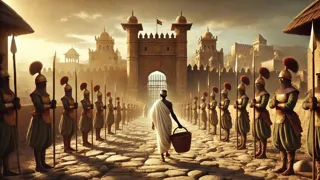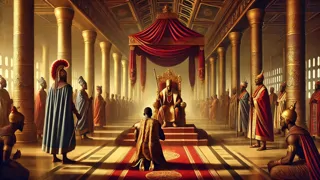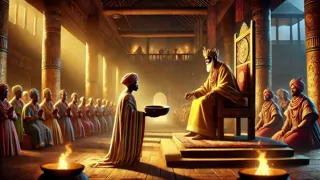Introduction
Olumide rose before sunrise, the scent of dew on millet and yam fields filling his lungs as he tied the worn leather laces of his sandals. In his small thatched hut at the edge of Udo village, candlelight danced across the wooden walls, illuminating a simple clay pot of porridge his wife had prepared. He ate silently, savoring every spoonful, mindful that his honesty had earned him the trust of neighbors and traders from distant towns. No one in the region had ever known Olumide to bend the truth. When his neighbors bartered for yams or goats, they did so without worry that the farmer would cheat them. Schoolchildren and elders alike would visit his stall at market simply to hear his gentle voice and appreciate that his words were as steady as the river that carved the valley. News of his integrity drifted through kingdoms beyond Udo, eventually reaching the palace of King Adebola. In the royal court, murmurs of a man whose honesty was said to be perfect intrigued courtiers and advisors, for they believed absolute truth was impossible. That belief piqued the king’s pride and curiosity: he summoned Olumide to test whether such virtue could withstand royal cunning. Heart pounding with equal parts fear and resolve, Olumide swept aside his mat, offered prayers to the ancestors, and stepped into the first light of dawn. He carried nothing but a woven basket of yams and a calm confidence built over decades of speaking only what he knew to be true. The path ahead would lead him from familiar fields into the heart of splendor—and peril—where honesty alone would be his shield.
The Summoning at Sunrise
Olumide’s journey began on a narrow track that cut through waving millet fields and clusters of baobab trees. Birds erupted in flocks at his approach, startled by the sound of his footsteps on sun-warmed earth. He walked slowly, recalling every moment of his life where speaking the truth had steered him through conflict: the time he guided lost travelers by naming the exact bend in the river; the day he admitted to a merchant that he’d miscounted coins and promptly returned the extra. As a boy, he’d witnessed lies bring ruin to families; as a man, he’d seen honesty restore trust and community. Now, each memory filled him with a quiet courage that battled any pang of doubt. Midway along the road, the royal messenger appeared—an ebony-skinned youth clutching a scroll sealed in crimson wax. The boy knelt, extending the message embroidered in gold ink: "Olumide of Udo, come before King Adebola at first light. Speak your truth, or face the consequences of silence." Heart thudding, the farmer accepted the mandate without complaint. He knelt to the messenger, bowed his head to the earth, and rose again, aware that many had refused the king’s summons and never returned. Behind him, the village boundary faded, replaced by orchards tended in straight lines and well-guarded stables. Guards in gleaming helms challenged him at each checkpoint, but he answered each question simply: "I am Olumide, the farmer of Udo," and they let him pass. At last, he stepped through the carved wooden gates of the palace, his sandals silent on marble floors polished to a mirror sheen. Courtiers in vibrant silk robes watched him with concealed smiles or furrowed brows. The air was cool with the spray from a marble fountain at the center of the courtyard, where white lotus blossoms drifted atop clear water. Throne chambers loomed ahead, and Olumide’s resolve held firm. He was a man known for speaking only truth, and now that same truth would carry him into the gilded lair of power itself.

Trials of Truth
King Adebola reclined on a raised dais beneath a canopy of crimson velvet, the glow of torches casting shifting shadows on his stern face. Around him sat courtiers with jeweled necklaces and silken turbans, eyes bright with anticipation. The farmer knelt in the center of the polished hall, feeling the hush descend like a weight. The king’s voice, deep and measured, broke the silence: "Olumide of Udo, your fame precedes you. They say you have never told a lie. I shall test your candor." A silver bowl filled with gold coins appeared, placed at the farmer’s feet. "Tell me," the king began, "does this bowl contain one hundred gold pieces, or more? If you do not answer correctly, guards will escort you to the dungeons." The audience leaned forward, breath held. Olumide knelt, studying the coins that glinted like captured sunlight. "My king," he replied softly, "I cannot say how many coins there are without counting. I see that they shine brightly, but I know not their number." A murmur ran through the hall. The king’s lips tightened. "Bold answer," he said. "Count them now—swiftly—and speak the truth." Without hesitation, Olumide counted each coin exactly: one by one, his fingers steady, until he reached seventy-nine. "Seventy-nine, my king," he announced. "If more remain unseen, I see none." Gasps spread among the courtiers. Many had expected the farmer to guess—perhaps add a few coins to impress royalty. Instead, Olumide trusted only what he had counted. The king motioned to an attendant, who tipped the bowl. A single coin slid out, clinking once. "I gave you eighty," the king declared. "You missed one." Olumide bowed his head. "I counted precisely what was before me, sire. I did not presume coins hidden within folds of bowl."

The king frowned, rose, and paced as courtiers whispered. Then he struck his staff on the marble floor. "Enough. A second test." He beckoned an advisor, who presented a golden ring set with a ruby. "This ring belonged to my father. If you truly speak the truth, name the moment he wore it most proudly." The hall quieted. Some snickered, believing the question absurd—who could know a king’s private memory? But Olumide did not flinch. "I do not know the exact hour, my king," he said. "But I know it was the day he ended a great war, when he returned this ring to his mother. He was proud when he laid down arms and offered peace." The ruby glowed in torchlight, and the courtiers blinked. Many assumed the farmer would invent some romantic legend. Instead, he spoke plainly of the peace treaty carved into the valley stones. The king’s gaze softened for a moment, then sharpened like a blade ready to strike.
When Truth Prevails
A hush fell over the court as King Adebola nodded slowly, curiosity mingling with frustration. He lifted his staff once more. "Final trial," he declared. "Answer me truthfully, Olumide: if I order you to swear by the goddess of justice that you speak only truth, will you obey or break your oath to serve your own honesty?" Many believed the king aimed to corner the farmer—oaths to deities often bound one to hidden clauses. But Olumide’s mind was clear. "Sire, I swear by the goddess that I will speak only what I know to be true. And if by fate I stray, may I suffer no greater penalty than a lesson in humility." The king’s eyes narrowed. "Very well. You spoke your oath before all. Now tell me: why is this service valuable to your people?" Olumide rose to his feet, voice unwavering. "Honesty brings safety, sire. When neighbors trust each other’s word, trade flourishes. When rulers trust their subjects, rebellion fades. My service lies not in flattery but in revealing justice and preventing cruelty."

Murmurs filled the hall. The king paced before the dais, staff tapping like a heartbeat. Then he raised a hand. A servant produced a plain wooden bowl, dull and unadorned. "Why this bowl, farmer?" asked Adebola. "Your father’s ring and my gold bowl were ornate—yet you confessed to missing one coin. What lesson hides in this wooden dish?" Olumide leaned forward, meeting the king’s gaze. "The plain bowl shows that truth needs no gilding. It holds what it holds—no more, no less. It demands no deception to appear precious, for its value lies in clarity of purpose."
The king stood silent, his court awaiting judgment. Finally, Adebola lowered his staff and smiled—a rare gesture that softened his regal features. He stepped from the dais and crouched before Olumide. "You have shown me a mirror, honest man. My cunning schemes reveal only my own doubts."
He rose again and addressed the court. "Let this farmer return to Udo with honor. Let his honesty be enshrined in our laws. May any who lie in service of this throne learn from his example." Courtiers broke into applause, and Olumide bowed deeply. Despite exhaustion, he felt a surge of hope: that a kingdom once ruled by fear might now thrive on trust. As he departed, lanterns lit his path, and villagers lined the road to greet the man who never lied.
















